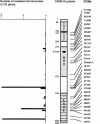CARD15/NOD2 mutational analysis and genotype-phenotype correlation in 612 patients with inflammatory bowel disease
- PMID: 11875755
- PMCID: PMC379113
- DOI: 10.1086/339432
CARD15/NOD2 mutational analysis and genotype-phenotype correlation in 612 patients with inflammatory bowel disease
Abstract
CARD15/NOD2 encodes a protein involved in bacterial recognition by monocytes. Mutations in CARD15 have recently been found in patients with Crohn disease (CD), a chronic inflammatory condition of the digestive tract. Here, we report the mutational analyses of CARD15 in 453 patients with CD, including 166 sporadic and 287 familial cases, 159 patients with ulcerative colitis (UC), and 103 healthy control subjects. Of 67 sequence variations identified, 9 had an allele frequency >5% in patients with CD. Six of them were considered to be polymorphisms, and three (R702W, G908R, and 1007fs) were confirmed to be independently associated with susceptibility to CD. Also considered as potential disease-causing mutations (DCMs) were 27 rare additional mutations. The three main variants (R702W, G908R, and 1007fs) represented 32%, 18%, and 31%, respectively, of the total CD mutations, whereas the total of the 27 rare mutations represented 19% of DCMs. Altogether, 93% of the mutations were located in the distal third of the gene. No mutations were found to be associated with UC. In contrast, 50% of patients with CD carried at least one DCM, including 17% who had a double mutation. This observation confirmed the gene-dosage effect in CD. The patients with double-dose mutations were characterized by a younger age at onset (16.9 years vs. 19.8 years; P=.01), a more frequent stricturing phenotype (53% vs. 28%; P=.00003; odds ratio 2.92), and a less frequent colonic involvement (43% vs. 62%; P=.003; odds ratio 0.44) than were seen in those patients who had no mutation. The severity of the disease and extraintestinal manifestations were not different for any of the CARD15 genotypes. The proportion of familial and sporadic cases and the proportion of patients with smoking habits were similar in the groups of patients with CD with or without mutation. These findings provide tools for a DNA-based test of susceptibility and for genetic counseling in inflammatory bowel disease.
Figures


References
Electronic-Database Information
-
- Database of Single Nucleotide Polymorphisms, http://www.ncbi.nlm.nih.gov/SNP/index.html (for SNP5 [accession number ss2978533], SNP8 [accession number ss2978536], SNP12 [accession number ss2978537], and SNP13 [accession number ss2978539]
-
- dHPLC Melt Program, http://insertion.stanford.edu/melt.html
-
- GenBank, http://www.ncbi.nlm.nih.gov/Genbank/index.html (for CARD15/NOD2 genomic sequence information [accession numbers AJ303140, AF178930, and NT_030834])
-
- Online Mendelian Inheritance in Man (OMIM), http://www.ncbi.nlm.nih.gov/Omim/ (for CD [MIM 266600] and UC [MIM 191390])
References
-
- Bertin J, Nir WJ, Fischer CM, Tayber OV, Errada PR, Grant JR, Keilty JJ, Gosselin ML, Robison KE, Wong GHW, Glucksmann MA, DiStefano PS (1999) Human CARD4 protein is a novel CED-4/Apaf-1 cell death family member that activates NF-κB. J Biol Chem 274:12955–12958 - PubMed
-
- Brant SR, Panhuysen CIM, Bailey-Wilson JE, Rohal PM, Lee S, Mann J, Ravenhill G, Kirschner BS, Hanauer SB, Cho JH, Bayless TM (2000) Linkage heterogeneity for the IBD1 locus in Crohn’s disease pedigrees by disease onset and severity. Gastroenterology 119:1483–1490 - PubMed
-
- Cho J, Nicolae D, Gold LH, Fields CT, LaBuda MC, Rohal PM, Pickles MR, Qin L, Fu Y, Mann JS, Kirschner BS, Jabs EW, Weber J, Hanauer SB, Bayless TM, Brant SI (1998) Identification of novel susceptibility loci for inflammatory bowel disease on chromosome 1p, 3q, 4q: evidence for epistasis between 1p and IBD1. Proc Natl Acad Sci USA 95:7502–7507 - PMC - PubMed
-
- Colombel JF, Grandbastien B, Gower-Rousseau C, Plegat S, Evrard JP, Dupas JL, Gendre JP, Modigliani R, Bélaiche J, Hostein J, Hugot JP, Van Kruiningen H, Cortot A (1996) Clinical characteristics of Crohn’s disease in 72 families. Gastroenterology 111:604–607 - PubMed
Publication types
MeSH terms
Substances
Associated data
- Actions
- Actions
- Actions
- Actions
LinkOut - more resources
Full Text Sources
Other Literature Sources
Medical
Molecular Biology Databases

